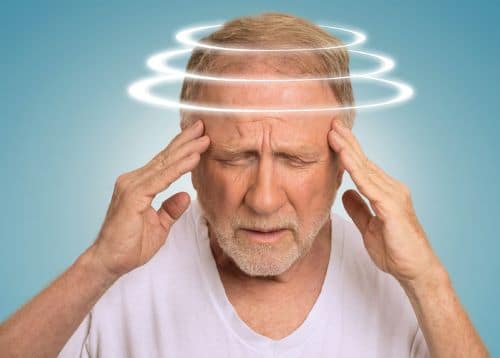Chronic dizziness is a common condition that doesn’t get the attention it deserves.
Dizziness, or vertigo, strikes up to 56% of Americans at some time in their lives. And it makes normal living impossible.[1]
Victims may find it difficult to keep their balance, making it dangerous to drive or even walk. Patients often can’t work.
Recent research found that dizziness that occurs right after a person stands, increases the chances of dementia.
The study was published in the journal Neurology. Researchers tracked the medical history of more than 2,100 older people for more than 12 years.[2]
They found that people with dizziness caused by orthostatic hypotension–a sudden drop in blood pressure when you stand–had a 40% higher risk of developing dementia. The bigger the blood pressure drop, the more likely they were to get dementia.
Exactly how sudden dizziness raises your odds for dementia isn’t known. But doctors theorize the mechanism might involve “direct damage to the blood vessels or progressive stiffness of the arteries,” said leading cardiologist Dr. Guy Mintz.[3]
Two Supplements Prevent Vertigo
Dizziness, or vertigo, can be difficult for doctors to treat. But a new study shows that there may be a simple, natural solution.
As described in the journal Neurology, researchers looked at 900 subjects who suffered from benign paroxysmal positional vertigo (BPPV). It’s usually triggered by changing the position of your head.[4]
The scientists split the subjects into two groups. One consisted of people with low vitamin D. The other had people with higher levels of the vitamin.
The low-D group took supplements containing 400 IU of vitamin D and 500 mg of calcium twice daily. The high-D group took no supplements.
People who took the supplements had a 24% lower rate of vertigo.
Forty-seven percent of those who didn’t take the supplements had a recurrence of vertigo. Just 38% of the supplement group had a recurrence.
Dr. Ji-Soo Kim was one of the study authors. He said the results were exciting because “going to the doctor to have them perform head movements” has been the main treatment for BPPV. But it usually works only temporarily.[5]
“Our study suggests an inexpensive, low-risk treatment like vitamin D and calcium tablets may be effective at preventing this common, and commonly recurring, disorder,” Dr. Kim said.
Vitamin D and calcium go hand-in-hand, because vitamin D helps your body absorb this important mineral. The best way to get sufficient calcium is to make sure full-fat dairy is a regular part of your diet.
Three quarters of Americans are vitamin D deficient. Have your doctor check your vitamin D level. You want your reading to be between 40-60 ng/mL.
If it’s lower, the best way to raise your levels is with sunlight. Try to get at least 20 minutes of sunlight a day with your arms and legs exposed.
This is not always easy, especially in the winter. Plus, as we age, our bodies gradually lose the capacity to produce vitamin D from sunlight. You can compensate by eating foods high in the vitamin. They include wild-caught salmon and other oily fish such as sardines, herring, and mackerel.
A good way to ensure you have enough vitamin D is to take a quality supplement. We recommend you take 5,000 IU a day. Take the D3 form, which is better absorbed by your body than D2.
Once again, research shows that natural solutions work better than mainstream medical treatments.
Editor’s Note: Discover the most effective natural methods to improve your health. Read our monthly journal Independent Healing. It’s your best source for unbiased, evidence-based medical information you won’t find anywhere else. To find out more, go HERE.
Related Articles
If You Take Vitamin D, You Also Need This…
New Study Reveals the Best Kind of Vitamin D
Don’t Ever Ignore Signs of this Vitamin Deficiency
Like this Article? Forward this article here or Share on Facebook.
[1]https://www.ncbi.nlm.nih.gov/pmc/articles/PMC4977009/
[2]https://n.neurology.org/content/early/2020/07/20/WNL.0000000000010420
[3]https://consumer.healthday.com/senior-citizen-information-31/dementia-news-738/get-dizzy-when-standing-up-it-could-be-risk-factor-for-dementia-760293.html
[4]https://n.neurology.org/content/early/2020/08/05/WNL.0000000000010343
[5]https://consumer.healthday.com/diseases-and-conditions-information-37/dizziness-and-vertigo-news-205/two-common-nutrients-might-keep-vertigo-at-bay-760083.html

